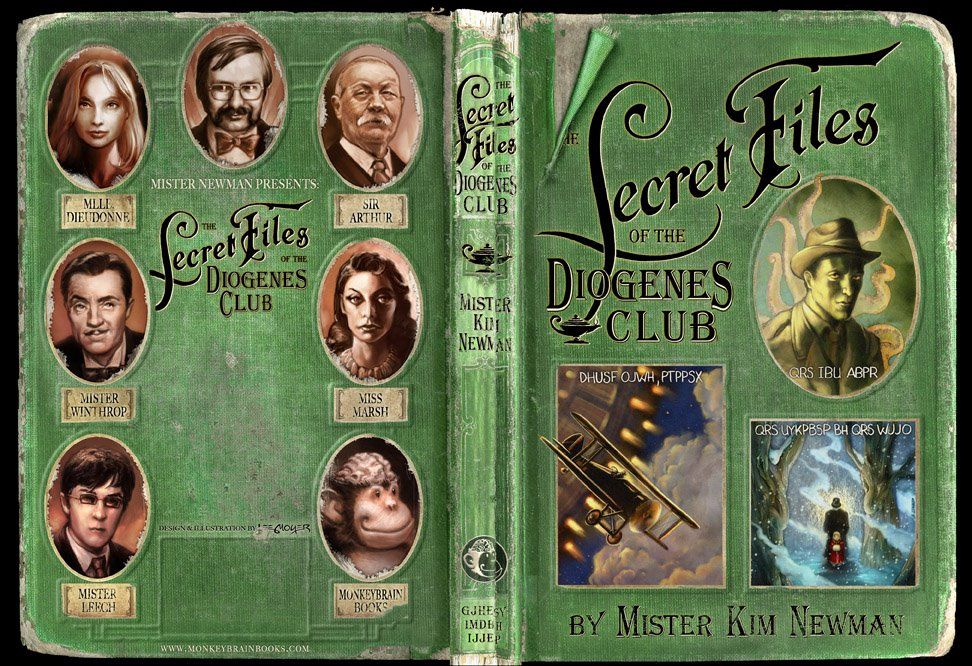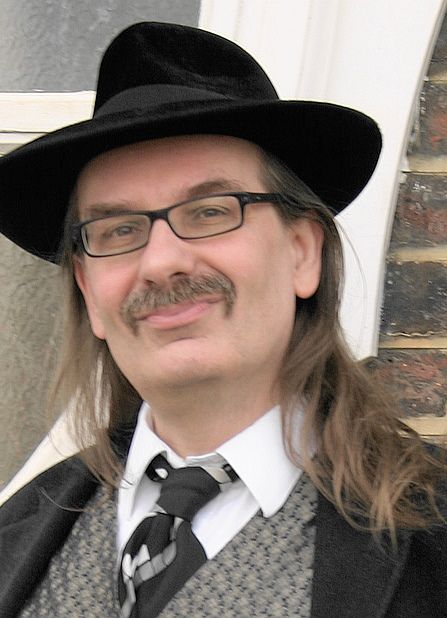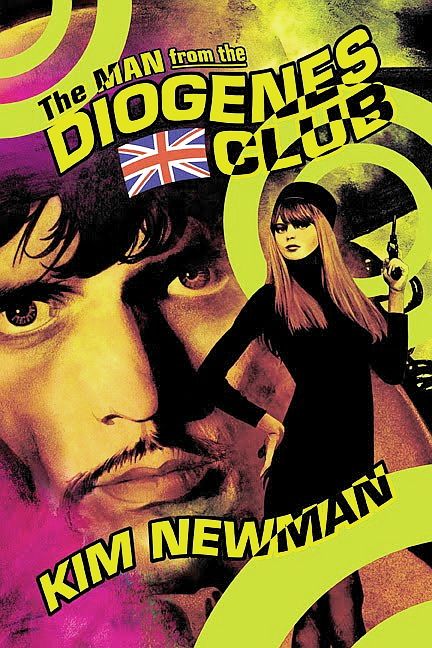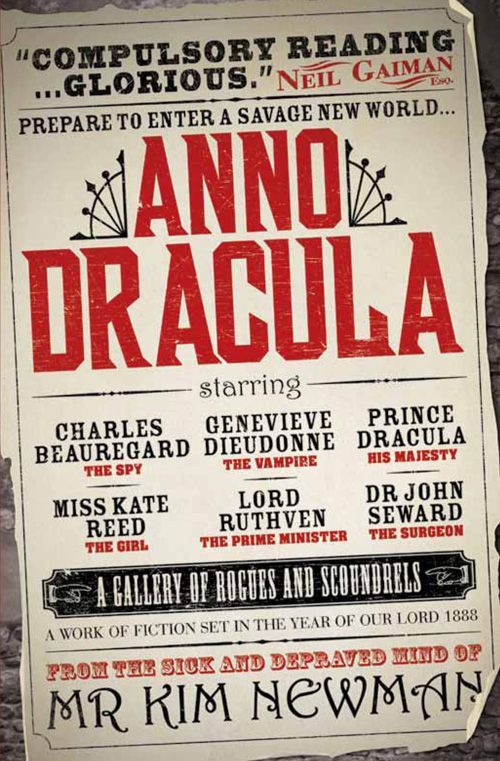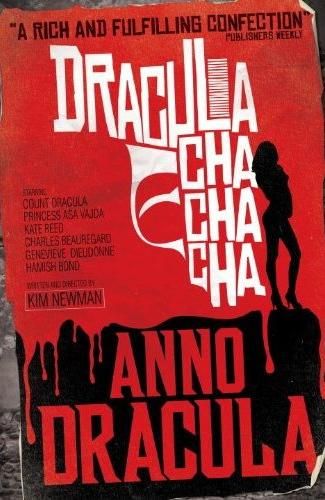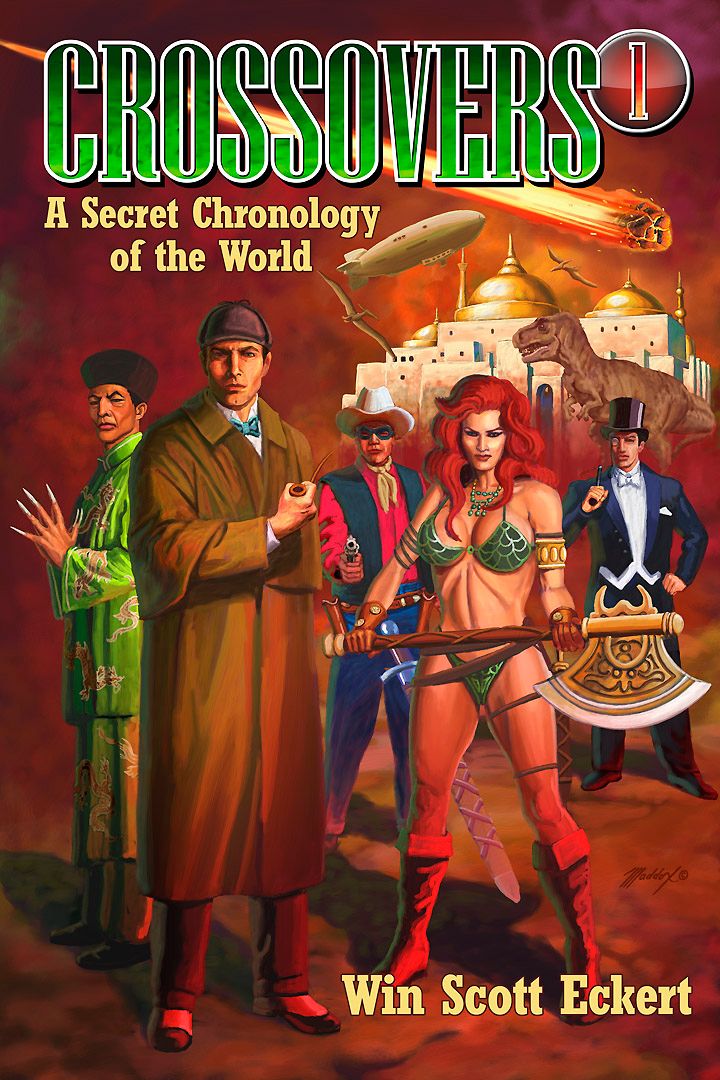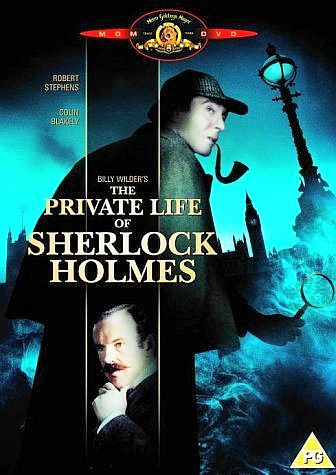This isn't strictly comics, but it's sort of comics-adjacent, and anyway it's too cool not to run.
Regular readers will recall that I am a big fan of Kim Newman's fiction, particularly his Anno Dracula series and also his tales of the Diogenes Club.
I found Anno Dracula back when it first came out, in the early 1990s, and was so enthralled with it that I sprung for the hardcover-- that was a big damn deal for me, twenty years ago-- and then I had to replace it, twice, because I kept loaning it out and not getting it back.
Years later, I discovered the Diogenes Club books, from Monkeybrain Press. I think the first collection starring Richard Jeperson, The Man From The Diogenes Club, is still my favorite.
So when Tom Green at Titan started to send me review copies of the new editions of the Anno Dracula books, I was ALL OVER that.
I already talked about one of those here not too long ago, The Bloody Red Baron, and now that the third one is coming out, Dracula Cha Cha Cha, Tom sent it along and added that he'd be willing to arrange an interview.
The chance to ask a bunch of gushy fanboy questions of a writer I've admired for decades was just too good to pass up, so of course I said yes, and here it is.
***
Tell us about the world of Anno Dracula, a series overview of sorts. So far you have Anno Dracula, The Bloody Red Baron, Dracula Cha Cha Cha, and Johnny Alucard. And there's also a couple of shorter pieces as well. Can you give us a few thoughts on each book, where the initial nudge came from for each particular story?
The overall premise is that the series is set in a world where Dracula defeated Van Helsing and took over Britain and its Empire c. 1885 - rather than be defeated and chased home to Transylvania to be killed. The first effect of this is to prove inarguably that vampires exist, and encourage all the other vampires of the world - which include all the vampires of fiction - to join Dracula's court or take public office. Then, vampirism spreads throughout the world, though not so fast as to eliminate regular humans - the limitation factor is that turning into a vampire offers possible immortality but is also dangerous. I based this on the fictional convention that, while some vampires (Dracula) live hundreds of years, a great many others (Lucy) don't last out their first week as undead.
Each book or story takes place in a new time and place, following the overall story from the 1880s down to (at the moment) the early 1990s and highlighting different milieux - The Bloody Red Baron is set during World War One, Dracula Cha Cha Cha is set in Rome in 1959 at the height of la dolce vita and Johnny Alucard is set in Romania and America from the 70s to the 90s and deals with Dracula's manifestation in the entertainment industry. I've also fit in pieces set in an English country house in 1923 and swinging London in 1968.
Usually, there's some source - from history or a particular type of fiction - I want to play with, but I suppose I want to encompass everything eventually. As I worked on Johnny Alucard and the new novellas, which went into the reissues of the second and third book, I began to get a sense of the whole series as one long, attenuated story, revolving around the shadowy figure of Dracula.
These new editions from Titan aren't just re-issues, there's huge amounts of bonus material.... they're like 'director's cut special editions' or something. Can you tell our readers about the additional material in each book? Did you go back and revise the original manuscripts of each novel also?
First off, I went through and fixed a few tiny things - typos, inconsistencies (write a series over years and they creep in) - but resisted the urge to do large-scale rewriting; I did put back a chapter that had been cut from The Bloody Red Baron, but signposted in such a way that it can be skipped if you're a purist. Then I added footnotes: some giving background historical material, some pointing out or crediting where I borrowed characters from, some just adding my own thoughts well after the fact. They're not exhaustive - I can't list every source for every character simply because I've forgotten quite a few specifics after all these years, and partly because I don't want to explain absolutely everything away. I have also put in some other bits of fiction - a stray Dracula story for Anno Dracula, new novellas for the sequels - and some relics of abandoned film projects. I was conscious that some folk would buy these new versions anyway, just to have the series on the shelf in uniform volumes (Titan are the first publisher to manage this in English) and felt that it would give value for money to support the books with this extra stuff.
You are way ahead of the curve in terms of treating literary and genre classics as a single shared universe-- the world of Anno Dracula is a huge crossover story with all sorts of characters from other books interacting with the original cast of Stoker's Dracula, in the same spirit as Philip Jose Farmer's Wold Newton cycle of books or Alan Moore's League of Extraordinary Gentlemen.
Can you talk about the allure of doing that kind of shared-universe story? What are the benefits and the hazards?
I am a great admirer of Farmer, which is probably why I took that approach - it wasn't part of my original outline, which depended just on the characters from Dracula, but came up pretty quickly while I was working. The cool thing is that I get to play with established characters, giving them my own interpretation - I love things like the conclave of Victorian criminal elements in Anno Dracula or the house party of politically ambitious vampires in 'Vampire Romance' that let me pitch disparate people together. The downside is that, once I decided that I'd always use folk from other people's fiction or history as supporting characters - the main cast, as it were, are from my own imagination - it gets fiddly trying to put a name and face to everyone who wanders through. I don't necessarily want people to stop and scratch their heads every time a named policeman turns up - they're usually there for plot reasons. It may also be true that this approach is getting overused - if I'd started writing the series after rather than before League of Extraordinary Gentlemen, I'd probably not have gone down this route to the extent I have.
In addition to the other 'crossover' elements, you make extensive use of a mythology of your own, the Kim Newman version of the Diogenes Club. Can you tell us about that series of books as well?
In the Anno Dracula series, I use Conan Doyle's Diogenes Club as a bureau of the British secret service; the idea isn't original to me - Billy Wilder and IAL Diamond hit on it for their film The Private Life of Sherlock Holmes.
Having explored that a bit, and created characters who are agents of the club, I decided I'd like to see them at work in a setting that more closely approximates our own history, so I've done a clutch of stories (collected in three books from MonkeyBrain, which will be amalgamated into a Titan volume eventually) about various characters connected to the Club at various points in its history.
Do you have plans for more stories of the world of Anno Dracula or for more tales of the various agents of the Diogenes Club? If so, can you tell us about those?
There will be one more Anno Dracula novel, though I'm vague about it now. As for the Diogenes Club and associated characters, they'll pop up in several things I have planned - including a comics project set in the 1930s and a forthcoming novel (Kentish Glory) about a school for unusual girls in the 1920s.
Are there any other upcoming projects you'd care to tell us about?
My next novel will be called An English Ghost Story. I've been working on that for a while. I also have a Phantom of the Opera-themed book in the works (Angels of Music) which relates to my other metafictional piece Professor Moriarty: The Hound of the d'Urbervilles. And I've got film, TV, comics, audio and theatre things in various stages of development.
Did you do anything special for Halloween?
This year, I was wrapped up in the production of a West End play, The Hallowe'en Sessions, which I co-wrote (and did other stuff for).
That was a success, so I might well be doing something similar next October.
***
And there you have it. Thanks again to Mr. Newman, and also to Tom Green for setting it up.
See you next week.

